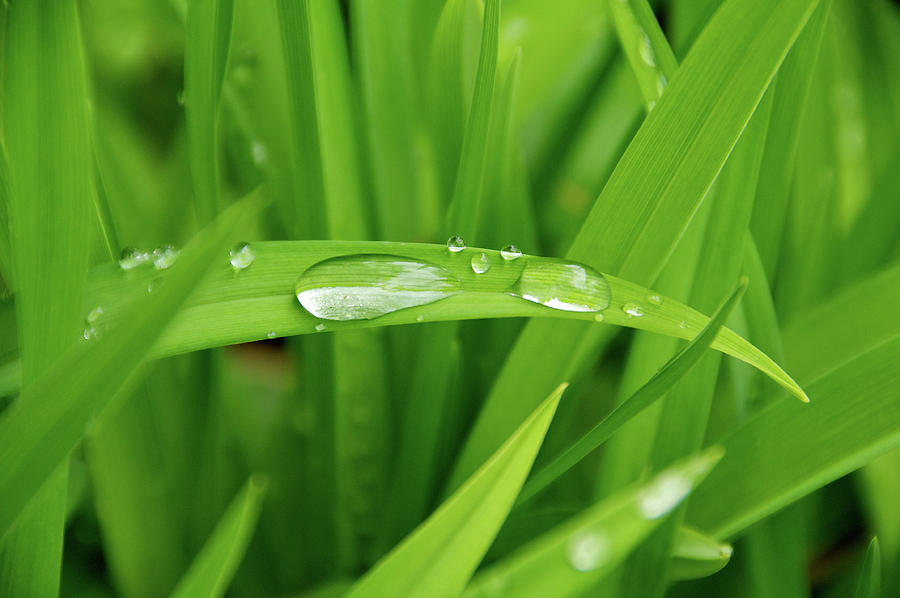 The grass singing is an example of a form of anthropomorphism. Eliot could be using the grass as a sign that the rain needed by the land is coming. Grass also represents growth and in this context the rain will be able to provide the land with the water needed for the plants to grow. With plants being a form of life, the grass can sort of represent life in a way. Grass needs water to survive so the singing can be the grass's way of feeling joyful and relieved that the rain is finally coming. Another interpretation the grass can represent is the present and the past. With the sign of rain, the land will be filled with new life in the form of healthier plants so the past of the drought can be forgotten and washed away by the rain. Along with the sound of the grass being a form of anthropomorphism, the sounds can also relate to nature with the sounds coming from the animals or other natural phenomenons. The grass could be a motif to provide a natural imagery to the poem along with the rain and thunder.
The grass singing is an example of a form of anthropomorphism. Eliot could be using the grass as a sign that the rain needed by the land is coming. Grass also represents growth and in this context the rain will be able to provide the land with the water needed for the plants to grow. With plants being a form of life, the grass can sort of represent life in a way. Grass needs water to survive so the singing can be the grass's way of feeling joyful and relieved that the rain is finally coming. Another interpretation the grass can represent is the present and the past. With the sign of rain, the land will be filled with new life in the form of healthier plants so the past of the drought can be forgotten and washed away by the rain. Along with the sound of the grass being a form of anthropomorphism, the sounds can also relate to nature with the sounds coming from the animals or other natural phenomenons. The grass could be a motif to provide a natural imagery to the poem along with the rain and thunder.
In the poem, line 353 says, "And dry grass singing", which comes before the line that mentions grass singing in the moonlight. This could also serve as evidence that the rain has come and made the grass moist and wet which resulted in the grass possibly "singing" due to being given growth and life again.
Usually the growth of plants is known to happen during the springtime. In the poem, line 327 says "Of thunder of spring over distant mountains", which suggests that the season is springtime in this poem. In addition, line 355 of the poem says "Where the hermit-thrush sings in the pine trees", which most likely indicates springtime due to birds mostly singing during the spring. Overall, with the spring season the grass is singing to welcome their new growth.
 The rooster like the singing grass can be represented as a sign that the rain is coming to the land. Usually, the sound of a rooster indicates an awakening due to the sunrise coming up. But, in this case the rooster can be signaling the plants to awaken and be aware that the rain is approaching to rejuvenate them. Not only could the rooster be signaling the plants, but also it could be letting the people know of the arrival of the rain. The people probably have been desperate for the rain to come and to hear the rooster’s calls lets them know that the rain is going to bring a fresh beginning to their land. The rooster is like a messenger that sends a message through its calls. The call of the rooster in this case instead of being a call of a new day is the call of new life being brought to this dry land.
The rooster like the singing grass can be represented as a sign that the rain is coming to the land. Usually, the sound of a rooster indicates an awakening due to the sunrise coming up. But, in this case the rooster can be signaling the plants to awaken and be aware that the rain is approaching to rejuvenate them. Not only could the rooster be signaling the plants, but also it could be letting the people know of the arrival of the rain. The people probably have been desperate for the rain to come and to hear the rooster’s calls lets them know that the rain is going to bring a fresh beginning to their land. The rooster is like a messenger that sends a message through its calls. The call of the rooster in this case instead of being a call of a new day is the call of new life being brought to this dry land. The grass singing is an example of a form of anthropomorphism. Eliot could be using the grass as a sign that the rain needed by the land is coming. Grass also represents growth and in this context the rain will be able to provide the land with the water needed for the plants to grow. With plants being a form of life, the grass can sort of represent life in a way. Grass needs water to survive so the singing can be the grass's way of feeling joyful and relieved that the rain is finally coming. Another interpretation the grass can represent is the present and the past. With the sign of rain, the land will be filled with new life in the form of healthier plants so the past of the drought can be forgotten and washed away by the rain. Along with the sound of the grass being a form of anthropomorphism, the sounds can also relate to nature with the sounds coming from the animals or other natural phenomenons. The grass could be a motif to provide a natural imagery to the poem along with the rain and thunder.
The grass singing is an example of a form of anthropomorphism. Eliot could be using the grass as a sign that the rain needed by the land is coming. Grass also represents growth and in this context the rain will be able to provide the land with the water needed for the plants to grow. With plants being a form of life, the grass can sort of represent life in a way. Grass needs water to survive so the singing can be the grass's way of feeling joyful and relieved that the rain is finally coming. Another interpretation the grass can represent is the present and the past. With the sign of rain, the land will be filled with new life in the form of healthier plants so the past of the drought can be forgotten and washed away by the rain. Along with the sound of the grass being a form of anthropomorphism, the sounds can also relate to nature with the sounds coming from the animals or other natural phenomenons. The grass could be a motif to provide a natural imagery to the poem along with the rain and thunder.
